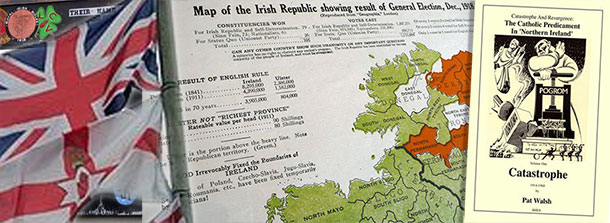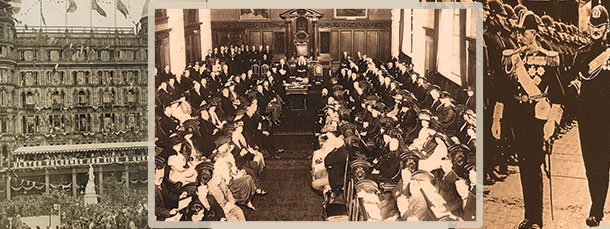12 January 2015 Edition
The unionist predicament over equality
UNCOMFORTABLE CONVERSATIONS

The only place the Ulster Protestant community can obtain real state politics is within a new Irish state constructed on the basis of equality for all its citizens
Confronted by Irish democracy in the 1918 election and the demand for a republic, the British Government decided to construct against it a pseudo-state in the Six Counties with its own parliament – nobody on the island, nationalist or unionist, had ever called for such a thing
GERRY ADAMS recently referred to the fact that Ulster Unionists have a big problem with equality. The question must therefore be asked, why?
Unionism seems uninterested in equality even when and where there is numerical equality between the communities in the North. It is determined to fly the flag over ‘Fenians’ as much as it can and unionism must be seen to predominate in what it sees as its territory, given to it to rule by Britain in 1921. Of course, it no longer rules but the pretence must continue, it seems.
Certainly, unionism has always had a supremacist character which was accentuated by the character of British imperialism. In the 19th century, imperialism held there to be a strict division between “great governing races” and “lesser breeds” (or natives). Ulster unionists saw themselves as the former and the Irish as the latter.
When the demand for Home Rule came to the fore it was the thought that the unionists might become a minority and be governed by an Irish majority that was the driving force behind opposition to even a Home Rule parliament in Dublin.
However, it was what Britain did in 1921 that really enhanced the supremacist character of Ulster unionism. When confronted by Irish democracy in the 1918 election and the demand for a republic, the British Government decided to construct against it a pseudo-state in the Six Counties with its own parliament. Nobody on the island, nationalist or unionist, had ever called for such a thing.
The unionists had simply wanted the maintenance of the Union by Britain – or, failing that, the Six Counties remaining as they were in the Union. However, Westminster decided that what they called ‘Northern Ireland’ must be constructed, as a place apart.
The thing called ‘Northern Ireland’ had a devious political purpose.

• Flag-waving is actually a sign of insecurity – it has to be done to reassure unionists that they are still 'British' and still top dog
Britain still had its eyes on the bulk of the island and decided to construct something the Irish independence movement would feel it could ultimately possess if it did not go too far in being independent. After the Treaty was signed, governments in the 26-County state had to be on their best behaviour in order to ever get a chance of regaining the Six Counties. As a result, and faced with this dilemma, de Valera and his successors abandoned the Northern Catholics and concentrated on making their own state as independent as possible.
However, the detachment of the province from Britain had a big impact on Ulster unionism. Life was now of a much more modest and insular character. Being once part of a worldwide empire, the Ulster unionist was now constricted into the single role of mastering the natives in the Six Counties, doing Britain’s dirty work whilst the province was kept ‘at arm’s length’.
The Ulster Protestants wanted to be a normal part of the British state but British policy did not allow it. Westminster said they must govern the large body of nationalists in their territory from a separate parliament outside the democratic structures of the state.
This is what made the Civil Rights movement so successful.
Ulster unionism could not concede simple democratic demands without combusting. Its mass base, which elected the unionist government in Stormont, had to feel a superiority over Catholics or it would replace its leaders. Caught between the need for reform and its need for supremacy, O’Neill, Chichester Clark and Faulkner all failed and Stormont fell.

• Ulster unionism will not concede simple democratic demands without combusting
Despite gaining the Six Counties, the Union was reduced to the mere symbols of the state – the crown, the queen, the Union flag, etc.
One of the chief concerns of unionists became the flying of flags in the face of Fenians, presumably to show who still has the upper hand.
Flag-waving is actually a sign of insecurity as it has to be done to reassure unionists that they are still ‘British’ and still top dog. It is no surprise then that it has increased since the Good Friday Agreement.
Unless it has predominant rights over marching and the marking of territory, unionism refuses to engage with nationalists. But, in resisting the equality agenda, unionism is helping to fragment the unionist bloc and produce further withdrawal from politics from its middle-class component, accentuating unionism’s ‘yahoo’ and the fundamentalist character that embarrasses it.
The unionist predicament lies in the fact that they are being edged out of the Union.
They are in political limbo and unionism has been unable to resist this process. So unionist politics has been reduced to simply maintaining the remaining inequality that persists between the communities. That is a losing game.
The only place the Ulster Protestant community can obtain real state politics is within a new Irish state constructed on the basis of equality for all its citizens.
In the current situation, all that can be done is defending inequality and defending the indefensible.
DR PAT WALSH is author of ‘Catastrophe and Resurgence: The Catholic Predicament in Northern Ireland’




